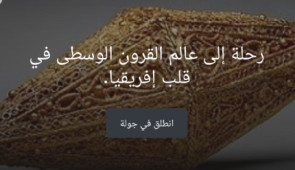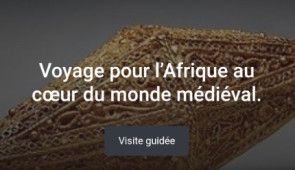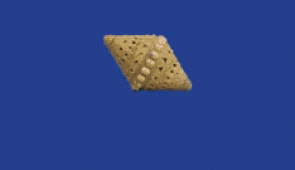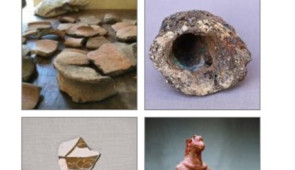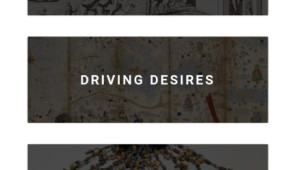‘Caravans of Gold’ app reaches global audience by going small
Students and Library collaborate on The Block Museum’s multilingual, minimal computing app
- Link to: Northwestern Now Story
EVANSTON, Ill. --- What crosses continents, can travel 13 centuries into the past, and takes up just 10 MB on a smartphone?
The Block Museum of Art at Northwestern University has released a free mobile web app designed to share the groundbreaking touring exhibition “Caravans of Gold, Fragments in Time” with international audiences.
Developed with a team of Northwestern students and the University Libraries, the app makes use of recent developments in mobile technology and the minimal computing movement to make an online version of the exhibition widely accessible.
“Caravans of Gold” is a first-of-its-kind exhibition that highlights West Africa’s global reach in the 8th to 16th centuries. By exploring the impact of Saharan trade routes on a medieval economy fueled by gold, the exhibition upends historical misconceptions and demonstrates Africa’s central place in the medieval world.
Curated by The Block’s Associate Director of Curatorial Affairs, Kathleen Bickford Berzock, the major exhibition includes extraordinary loans from partner museums and institutions in Mali, Morocco and Nigeria, including many items that have never been presented in the North America. The African loans are displayed among artworks and material remains from 32 international collections, providing visual evidence of a vast global trade system.
The app was created to ensure that global audiences with limited or intermittent access to network bandwidth and mobile data can engage with the exhibition. Presented in English, French and Arabic, the multilingual format offers accessibility to those in the exhibition’s African partner countries and beyond.
“Our African colleagues showed extraordinary commitment and generosity in sharing their cultural heritage with North American audiences,” Berzock said.
“We’ve long been focused on making sure that some version of the exhibition would be shared with the African lending institutions and the audiences they serve.”
“Access to knowledge for all is an equity issue,” said Lisa Corrin, The Block’s Ellen Philips Katz Director. “The development of this app exemplifies The Block’s commitment to a global perspective and equity, core values of our work. The project is designed to take joint scholarship, generated through international partnerships, and ensure access by global communities whose shared histories and culture stretch back to the medieval world.”
Malian archaeologist Mamadou Cisse, one of the scholar advisors for the project and the chief of the Cultural Mission of Kangaba, said the digital app succeeds in preserving the exhibition’s core focus.
“The fragments themselves have a lot to tell. On an archaeological site it’s hard to find whole objects. We only have the fragments, which show us what the site represented in the past. By putting whole objects alongside fragments in this exhibition helps to improve our knowledge about what we’ve found,” Cisse said. “This app arrived at just the right time. It is a period marked by low public attendance at museums across Africa due to the COVID-19 pandemic.”
At the Intersection of Technology and Equity
Curatorial Graduate Fellow Sara Estrela and 13 Northwestern undergraduates explored curatorial approaches and revised exhibition texts for remote audiences in Berzock’s 2019 spring seminar “Reshaping an Exhibition: Preparing ‘Caravans of Gold’ for Presentation in Africa.”
During the process, students studied contemporary debates around the collection and display of African art in museums.
“We grappled with pressing questions,” said Nicholas Liou, a student in the course. “What impact does our position as North American students have on our interpretation of African material culture for African audiences? How can we prioritize ethical strategies of presentation and interpretation?”
Students worked with Chris Diaz, digital publishing librarian at Northwestern University Libraries, to research digital access capabilities in the exhibition’s partner countries. Intrigued by the challenges of the constraints, Diaz ended up serving as the app’s lead developer.
Inspired by the growing minimal computing movement, which challenges developers to utilize the least amount of hardware, software or network capacity to maximize access, decrease obsolescence and reduce e-waste, Diaz used Google’s open source framework for Progressive Web Apps (PWAs).
The resulting digital platform is only 10.5 MB and does not require an internet connection to use after the initial app page visit.
When users visit the app for the first time, the files are cached on the device so that they can view the exhibition works and guided tours without additional network requests, making the app usable when the user moves offline or onto an unstable network.
“Together we went way beyond what a library or a museum could typically do on their own,” Diaz said. “As far as I know, this will be the first multilingual, progressive web app built specifically as a minimal computing example.”
About ‘Caravans of Gold’
More than 10 years in the making, The Block museum launched “Caravans of Gold” with the vision of inspiring deeper knowledge of Africa’s central place in world history and transforming teaching around medieval history.
The mobile app joins a suite of available “Caravans of Gold” teaching materials produced by The Block including an exhibition website, a free, downloadable Teacher’s Guide, and a major publication with Princeton University Press.
During its six-month run at The Block Museum (Jan. 26 to July 21, 2019), a record-breaking 35,000 guests took in the exhibition, while nearly 60,000 guests visited during its run at Toronto’s Aga Khan Museum (Sept. 2019 to Feb. 23, 2020). Even higher numbers are expected at the exhibition’s third and final location, The National Museum of African Art, Smithsonian Institution, in Washington, D.C.
“The legacy of medieval trans-Saharan exchange and Africa’s world-building role has been removed from our historical narratives and art histories. It is crucial for these materials to reach audiences widely,” Corrin said. “At this moment here in the United States we also want to provide resources to support the work of dismantling systemic racism. This project makes visible how Black history is world history. Our goal is to inspire audiences to ask why this important history, these stories, are relatively unknown and untaught.”
More News at Northwestern Now
Multimedia Downloads
Photos
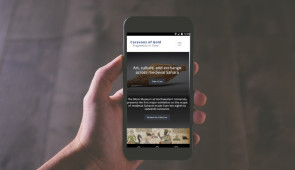
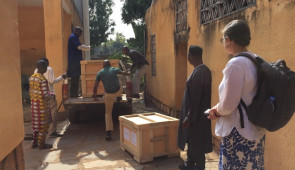
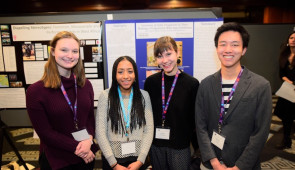
L to R: Emily Rose Andrey, Brianna Heath, Meghan Clare Considine and Nicholas Liou present their ongoing research on the Progressive Web App in a poster session at 108th College Art Association Annual Conference. Courtesy Block Museum of Art, Sean Su Photography.
